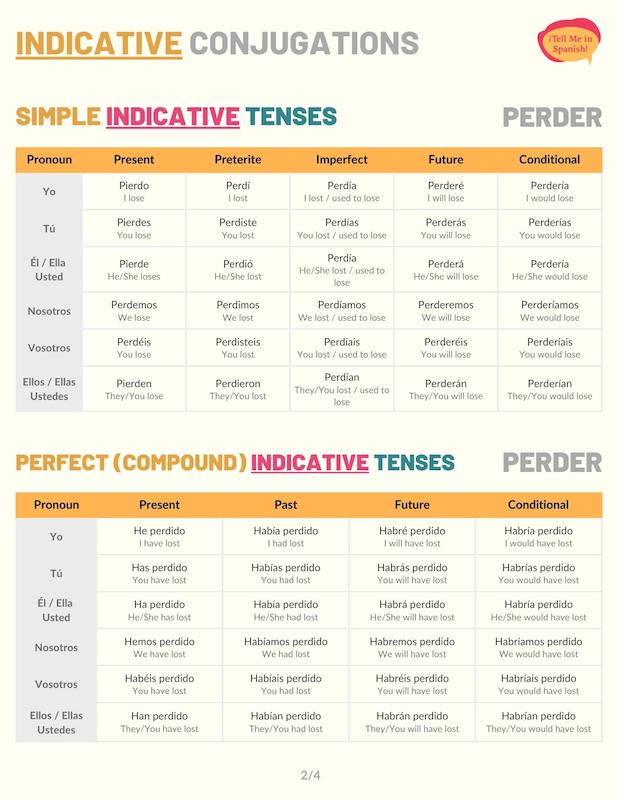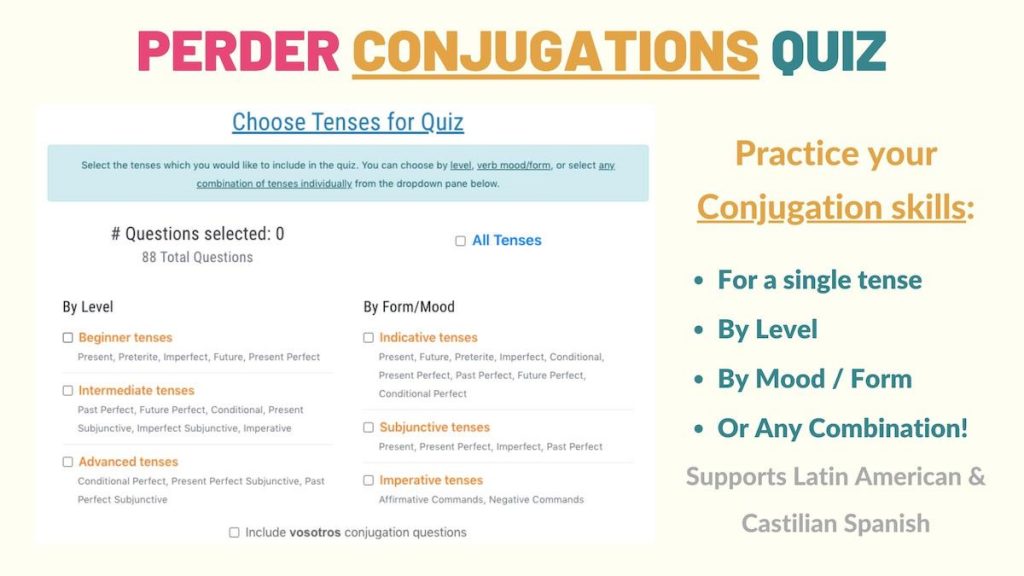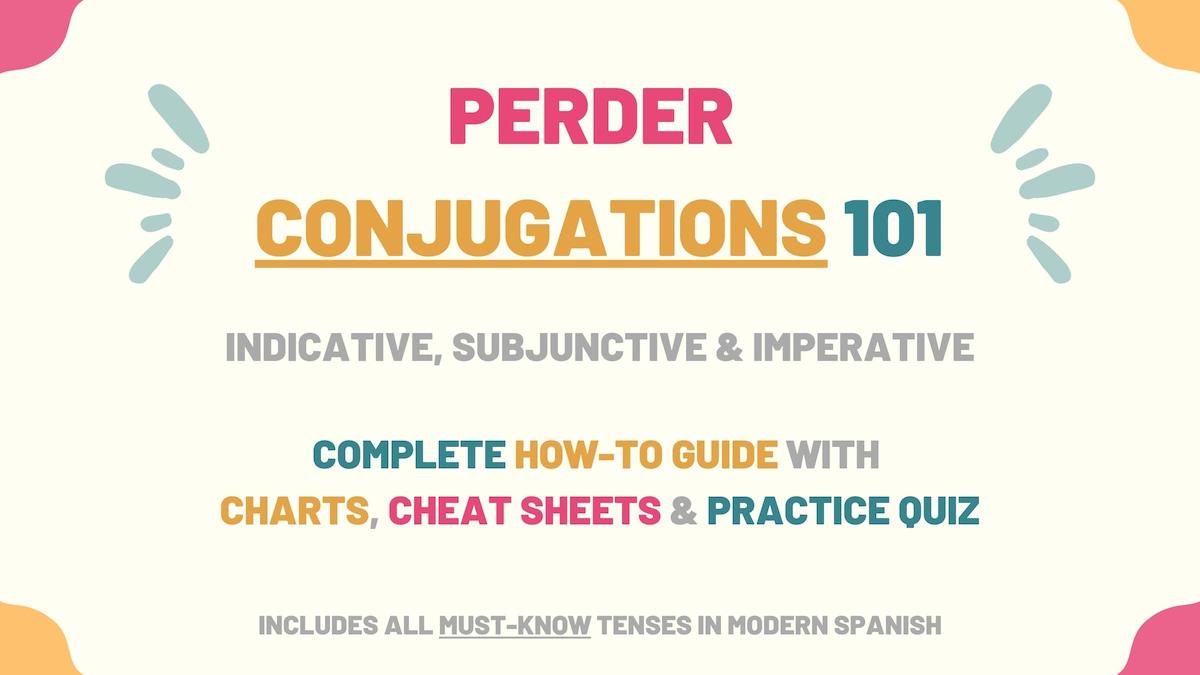Perder is a verb with an E to IE stem change. Given that this verb can help you understand how this change is applied to -ER verbs, we’ll go over the perder conjugation patterns in this guide. Here is a summary of what you’ll learn:
- Perder Overview
- Indicative Tenses of Perder Conjugations
- Subjunctive Tenses of Perder Conjugations
- Imperative (Commands) of Perder Conjugations
- Uses & Examples
- Download Perder Conjugation Tables & Uses Cheat sheets
- Perder Conjugation Practice Quiz
Overview of Perder
| Verb Characteristic | Property |
|---|---|
| Verb Type | -ER |
| Irregular | No |
| Infinitive | Perder |
| Gerund (Present Participle) Form | Perdiendo |
| Past Participle Form | Perdido |
| Synonyms | Extraviar. |
Stem Changes: E to IE
- Present Indicative: pierd for all subjects except ‘nosotros’ and ‘vosotros’.
- Present Subjunctive: pierd for all subjects except ‘nosotros’ and ‘vosotros’.
- Affirmative Imperative: pierd for all subject pronouns except ‘vosotros’.
- Negative Imperative: pierd for all subject pronouns except ‘vosotros’.
Indicative Conjugations of Perder
Present tense
Perder conjugations in the present tense have an E to IE stem change, which doesn’t apply to ‘nosotros’ and ‘vosotros’. These conjugations of perder are used to explain that someone misses or loses something. For example: Yo siempre pierdo mis llaves.
| Person | Conjugation | Translation |
|---|---|---|
| Yo | Pierdo | I lose |
| Tú | Pierdes | You lose |
| Él / Ella Usted | Pierde | He/She loses You (formal) lose |
| Nosotros | Perdemos | We lose |
| Vosotros | Perdéis | You lose |
| Ellos / Ellas Ustedes | Pierden | They lose You (plural) lose |
Preterite tense
Perder conjugated to the preterite tense has no stem changes. Use perder’s preterite conjugations to refer to things people lost or missed in the past. For instance: Mi hermano perdió mi celular.
| Person | Conjugation | Translation |
|---|---|---|
| Yo | Perdí | I lost |
| Tú | Perdiste | You lost |
| Él / Ella Usted | Perdió | He/She lost You (formal) lost |
| Nosotros | Perdimos | We lost |
| Vosotros | Perdisteis | You lost |
| Ellos / Ellas Ustedes | Perdieron | They lost You (plural) lost |
Imperfect tense
Conjugate perder to the past imperfect tense to say that someone used to lose something repeatedly in the past. For example: ¿Te acuerdas que Tim siempre perdía su dinero?
| Person | Conjugation | Translation |
|---|---|---|
| Yo | Perdía | I lost I used to lose |
| Tú | Perdías | You lost You used to lose |
| Él / Ella Usted | Perdía | He/She lost He/She used to lose You (formal) lost You (formal) used to lose |
| Nosotros | Perdíamos | We lost We used to lose |
| Vosotros | Perdíais | You lost You used to lose |
| Ellos / Ellas Ustedes | Perdían | They lost They used to lose You (plural) lost You (plural) used to lose |
Near future
Ir (present tense) + a + perder is the formula to conjugate perder to the immediate future in Spanish. These conjugations convey that someone will lose or miss something soon in the future. Si no tienes cuidado, vas a perder tus cosas.
| Person | Conjugation | Translation |
|---|---|---|
| Yo | Voy a perder | I’m going to lose |
| Tú | Vas a perder | You’re going to lose |
| Él / Ella Usted | Va a perder | He/She is going to lose You (formal) are going to lose |
| Nosotros | Vamos a perder | We’re going to lose |
| Vosotros | Vais a perder | You’re going to lose |
| Ellos / Ellas Ustedes | Van a perder | They’re going to lose You (plural) are going to lose |
Future simple tense
When used in the future simple tense, this verb expresses that someone will lose or miss something in the future. For example: Este año, perderemos mucho dinero.
| Person | Conjugation | Translation |
|---|---|---|
| Yo | Perderé | I will lose |
| Tú | Perderás | You will lose |
| Él / Ella Usted | Perderá | He/She will lose You (formal) will lose |
| Nosotros | Perderemos | We will lose |
| Vosotros | Perderéis | You (formal) will lose |
| Ellos / Ellas Ustedes | Perderán | They will lose You (plural) will lose |
Conditional tense
In Spanish, the conditional forms of perder are used to say that someone would lose or miss something. If applicable to your sentences, you can include the conditions that need to be met for this to happen. No me perdería tu boda por nada del mundo.
| Person | Conjugation | Translation |
|---|---|---|
| Yo | Perdería | I would lose |
| Tú | Perderías | You would lose |
| Él / Ella Usted | Perdería | He/She would lose You (formal) would lose |
| Nosotros | Perderíamos | We would lose |
| Vosotros | Perderíais | You would lose |
| Ellos / Ellas Ustedes | Perderían | They would lose You (plural) would lose |
Present perfect tense
Haber (present forms) + past participle form of ‘perder’ is the structure we must use to form the present perfect tense in Spanish. These perder conjugations convey that someone has or hasn’t lost or missed something. For example: ¿Cuántas veces has perdido tu teléfono?
| Person | Conjugation | Translation |
|---|---|---|
| Yo | He perdido | I have lost |
| Tú | Has perdido | You have lost |
| Él / Ella Usted | Ha perdido | He/She has lost You (formal) have lost |
| Nosotros | Hemos perdido | We have lost |
| Vosotros | Habéis perdido | You have lost |
| Ellos / Ellas Ustedes | Han perdido | They have lost You (plural) have lost |
Past perfect
To say that someone had or hadn’t lost something before, use perder in its past perfect forms. In Spanish, the formula for the past perfect is haber (imperfect form) + past participle. Here is an example: ¿No dijiste que habías perdido tu cartera?
| Person | Conjugation | Translation |
|---|---|---|
| Yo | Había perdido | I had lost |
| Tú | Habías perdido | You had lost |
| Él / Ella Usted | Había perdido | He/She had lost You (formal) had lost |
| Nosotros | Habíamos perdido | We had lost |
| Vosotros | Habíais perdido | You had lost |
| Ellos / Ellas Ustedes | Habían perdido | They had lost You (plural) had lost |
Future perfect
When conjugated to the future perfect, this verb expresses that someone will have lost something by or before a specific moment in the future. These conjugations also refer to the things people might have lost. En unas horas habrán perdido el campeonato.
| Person | Conjugation | Translation |
|---|---|---|
| Yo | Habré perdido | I will have lost |
| Tú | Habrás perdido | You will have lost |
| Él / Ella Usted | Habrá perdido | He/She will have lost You (formal) will have lost |
| Nosotros | Habremos perdido | We will have lost |
| Vosotros | Habréis perdido | You will have lost |
| Ellos / Ellas Ustedes | Habrán perdido | They will have lost You (plural) will have lost |
Conditional perfect
The conditional perfect forms of this verb are used to say that someone would have lost something if a past circumstance had happened. For example: Si hubieras usado el GPS, no nos habríamos perdido.
| Person | Conjugation | Translation |
|---|---|---|
| Yo | Habría perdido | I would have lost |
| Tú | Habrías perdido | You would have lost |
| Él / Ella Usted | Habría perdido | He/She would have lost You (formal) would have lost |
| Nosotros | Habríamos perdido | We would have lost |
| Vosotros | Habríais perdido | You would have lost |
| Ellos / Ellas Ustedes | Habrían perdido | They would have lost You (plural) would have lost |
Progressive tenses
To form the Spanish progressive tenses, use estar conjugations + present participle (perdiendo, in this instance). With these conjugations, perder expresses that someone is losing a game at the moment of speaking. Nuestro equipo está perdiendo la final.
| Progressive Tense | Formula | Translation Example |
|---|---|---|
| Present | Estar (present) + perdiendo | I am losing |
| Preterite | Estar (preterite) + perdiendo | You were losing |
| Imperfect | Estar (imperfect) + perdiendo | He was losing |
| Future | Estar (future) + perdiendo | We will be losing |
| Conditional | Estar (conditional) + perdiendo | They would be losing |
Perder Subjunctive Conjugations
The Spanish subjunctive mood is used to discuss a person’s desires, demands, suggestions, doubts, expectations or to express hypothetical situations. In the sections below, we’ll review perder’s subjunctive conjugation charts.
Present subjunctive
Perder’s present subjunctive conjugation has an E to IE stem change for all subject pronouns except ‘nosotros’ and ‘vosotros’. These forms are used to wish, suggest, or request that someone loses something. For instance: Esos chicos me caen mal, ojalá que pierdan.
| Person | Conjugation | Translation |
|---|---|---|
| Yo | Pierda | I lose |
| Tú | Pierdas | You lose |
| Él / Ella Usted | Pierda | He/She loses You (formal) lose |
| Nosotros | Perdamos | We lose |
| Vosotros | Perdáis | You lose |
| Ellos / Ellas Ustedes | Pierdan | They lose You (plural) lose |
Present perfect subjunctive
The present perfect subjunctive of ‘perder’ is formed with haber (present subjunctive) + perdido. Use these conjugations to wonder, express doubt, or wish someone already has got lost or lost something. For example: ¿Por qué no llegan? ¿Crees que se hayan perdido?
| Person | Conjugation | Translation |
|---|---|---|
| Yo | Haya perdido | I have lost |
| Tú | Hayas perdido | You have lost |
| Él / Ella Usted | Haya perdido | He/She has lost You (formal) have lost |
| Nosotros | Hayamos perdido | We have lost |
| Vosotros | Hayáis perdido | You have lost |
| Ellos / Ellas Ustedes | Hayan perdido | They have lost You (plural) have lost |
Imperfect subjunctive
The Spanish imperfect subjunctive of perder allows you to talk about past suggestions, requests, or wishes related to someone getting lost or losing something. Te advertí que no perdieras tus llaves otra vez.
The imperfect subjunctive in Spanish has two conjugation endings:
Latin American Spanish version
| Person | Conjugation | Translation |
|---|---|---|
| Yo | Perdiera | I lost |
| Tú | Perdieras | You lost |
| Él / Ella Usted | Perdiera | He/She lost You (formal) lost |
| Nosotros | Perdiéramos | We lost |
| Ellos / Ellas Ustedes | Perdieran | They lost You (plural) lost |
Note: The pronoun vosotros is never used in Latin American Spanish. As a result, that pronoun and its conjugation have not been included in the table above.
Castilian Spanish version
| Person | Conjugation | Translation |
|---|---|---|
| Yo | Perdiese | I lost |
| Tú | Perdieses | You lost |
| Él / Ella Usted | Perdiese | He/She lost You (formal) lost |
| Nosotros | Perdiésemos | We lost |
| Vosotros | Perdieseis | You lost |
| Ellos / Ellas Ustedes | Perdiesen | They lost You (plural) lost |
Past perfect subjunctive
Use the past perfect subjunctive forms of perder to express that someone would have lost something if a past condition was met. You can also use these forms to convey regret for losing something. For example: Desearía que no hubieras perdido mi dinero.
| Person | Conjugation | Translation |
|---|---|---|
| Yo | Hubiera perdido | I had lost |
| Tú | Hubieras perdido | You had lost |
| Él / Ella Usted | Hubiera perdido | He/She had lost You (formal) had lost |
| Nosotros | Hubiéramos perdido | We had lost |
| Vosotros | Hubierais perdido | You had lost |
| Ellos / Ellas Ustedes | Hubieran perdido | They had lost You (plural) had lost |
Perder Imperative Conjugations
The imperative mood is used to give commands in Spanish. The affirmative imperative allows you to order people to perform an action, whereas the negative imperative instructs them not to perform an activity.
Affirmative commands
Perder affirmative commands have an E to IE change which is not applied to ‘vosotros’. Usually, these conjugations are used to tell people to get lost or lose something. For example: ¡Pierde, pierde!
| Person | Conjugation | Translation |
|---|---|---|
| Tú | Pierde | Lose |
| Usted | Pierda | Lose |
| Vosotros | Perded | Lose |
| Ustedes | Pierdan | Lose |
Negative commands
The negative imperative forms of perder have an E to IE stem change for all subjects except ‘nosotros’. These commands are used to order someone not to lose something. Por favor, no pierdan de vista a su hermano.
| Person | Conjugation | Translation |
|---|---|---|
| Tú | No pierdas | Don’t lose |
| Usted | No pierda | Don’t lose |
| Vosotros | No perdáis | Don’t lose |
| Ustedes | No pierdan | Don’t lose |
Meanings of Perder & Examples
Now that you’ve learned how to conjugate perder in Spanish, let’s see how to use this verb. Depending on the sentence and parts of speech your using, perder means to:
- Lose (direct object pronouns)
- Get lost (reflexive pronouns)
- Miss something (reflexive pronouns)
(Pronoun in Spanish) + [perder conjugated] + (noun)
Ese equipo perderá el partido.
That team will lose the game.
Mis primos se perdieron en el bosque.
My cousins got lost in the forest.
Nunca se nos habían perdido los pasaportes.
We had never lost our passports before.
No encuentro mis llaves, creo que las perdí.
I can’t find my keys, I think I lost them.
Take Note: The pronoun se works as a reflexive pronoun when being alone. But when combined with indirect object pronouns, it’s known as accidental se. Notice that you can use Spanish direct object pronouns to replace the things you lost.
Download Perder Conjugation Charts & Uses Cheat sheet

Perder is one of the most important and commonly used Spanish -ER verbs. It’s also has a few I to IE stem changes. I’ve created a cheat sheet PDF you can download which contains all the perder conjugation charts as well as its definitions and example uses so you can study it at your own pace.
Practice Quiz: Perder Conjugation

Now that you know how to conjugate this verb, the next step is to take the perder conjugation practice quiz. You can customize which tenses you can practice and master this verb’s I to IE stem changes.





